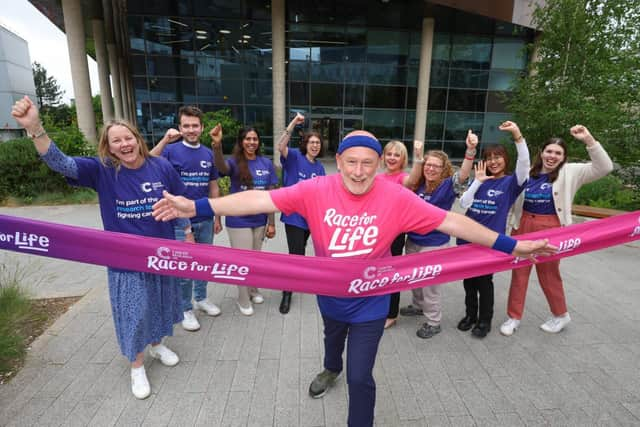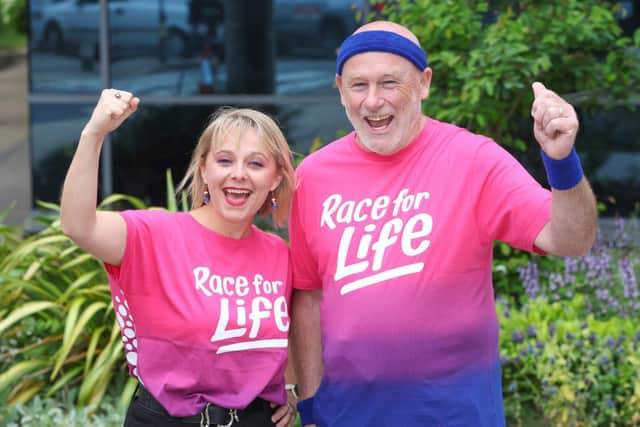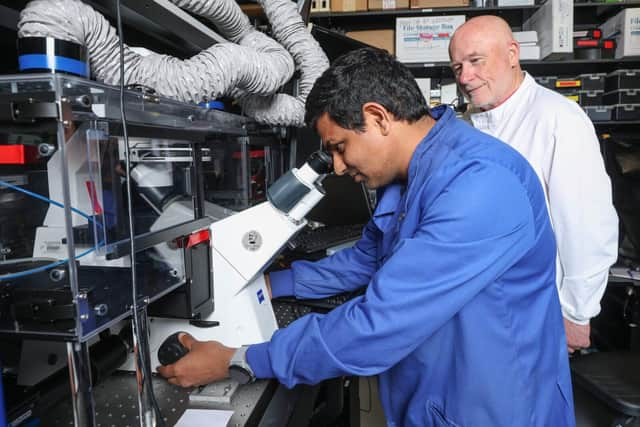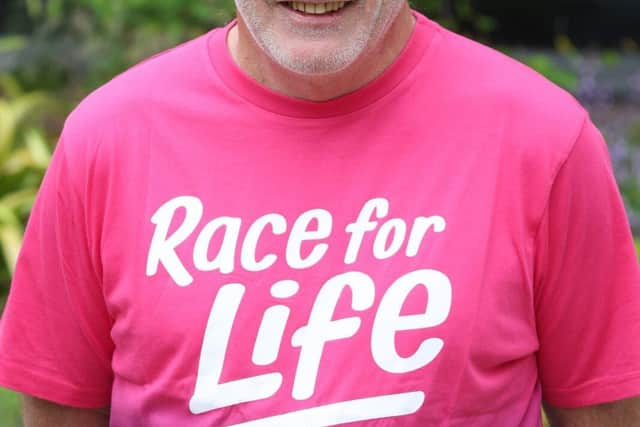Cancer survivor sees how Race for Life Portsmouth is helping scientists find new treatments
and live on Freeview channel 276
Mark Venables from Hamble met with the team working on a Cancer Research UK bladder cancer trial (AURORA) at the groundbreaking Southampton Clinical Trials Unit, to learn how money raised at the event is making a difference to people across the South during Bladder Cancer Awareness Month.
Mark understands the importance of research more than most after successfully being treated for the disease in 2019, receiving emergency care for an unrelated pulmonary embolism in 2010 and recovering from a brain aneurysm in 2022.
Advertisement
Hide AdAdvertisement
Hide AdMark, 67, said: “I know I’m very lucky to be here and remember the feeling of being told I had stage 2 bladder cancer. I took it really badly and emotionally it was really tough. Thankfully I had treatment options available to me and I’ve recovered well, but I know not everyone has that chance.


“Not so much is known about the rarer types of bladder cancer and so it’s incredibly important to keep funding the types of clinical trials I’ve seen happening right here in Southampton like the AURORA trial. Anything that can look further into them and develop good immunotherapy treatments is fantastic. I’m incredibly inspired and know that the fundraising really is worthwhile.”
The Cancer Research UK funded unit runs several of the charity’s clinical trials including the AURORA trial. Researchers are looking at whether an immunotherapy treatment could help patients with a rare and often incurable form of cancer of the urinary tract, funded by a CRUK grant of £814,000 with pharmaceuticals supplied by Roche.
The trial is studying whether the drug ‘atezolizumab’ can be effective for patients with urinary tract squamous cell carcinoma by blocking a protein that’s stopping the immune system from recognising, targeting and destroying cancer cells.
Advertisement
Hide AdAdvertisement
Hide AdProfessor of experimental cancer therapeutics, Simon Crabb and chief investigator of the AURORA trial, said: “There are currently no effective treatments for UTSCC because it is so rare and very few clinical trials have been conducted into this type of cancer. This trial, made possible by Cancer Research UK supporters, will help us show whether immunotherapy could offer patients a treatment option in the future.”


As well as working on the AURORA trial, Charlotte Stuart is one of many SCTU staff members taking part in the Race for Life events across the south coast.
The Portsmouth events take place at Southsea Common. On Saturday June 29 people can take part in the 5k mud-splattered obstacle course, Pretty Muddy Adults or Kids and on Sunday June 30 you can choose from the 3k, 5k and 10k events.
Mark is grateful to all the team for their efforts both at the SCTU and at Race for Life and to the hundreds of supporters enabling scientists to find new ways to prevent, diagnose and treat cancer to enable people to live longer, better lives.
Advertisement
Hide AdAdvertisement
Hide AdHe’s also keen to remind people to get checked by their GP straight away if they spot any signs and symptoms.


Mark said: “I first spotted blood in my pee after a game of golf. When it happened a couple more times over the next few months, I told my GP who said it was unlikely to be bladder cancer but referred me for an ultrasound.
“The scan didn’t highlight anything because it turned out my cancer was a flat, round tumour at the top of my bladder rather than looking like a piece of coral. The symptoms persisted though and so I sought a second opinion. I was given a cystoscopy where they put a camera inside your bladder and this revealed the tumour.
“I found it difficult to deal with my diagnosis, especially when I discovered the cancer had already started to invade the muscle which meant I would need three rounds of chemotherapy at University Hospital Southampton. I then had the choice of radiotherapy or a radical cystectomy to remove the bladder, prostate and nearby lymph nodes and I opted for the surgery which took place at Portsmouth’s QA hospital. Living with a stoma and urostomy was a major change, but I manage it well.
Advertisement
Hide AdAdvertisement
Hide Ad“The timing of lockdown meant the change in routine for everyone gave me time to rebuild my strength and I eventually used my performance on the golf course as a good measure of how well I was doing physically. Now I’m back to where I want to be, winning trophies again and am grateful for all the treatment and care I’ve received to get to this point.


“I’d like to thank everyone across Hampshire who supports Race for Life. Vital work is underway to prevent, diagnose and treat more than 200 types of cancer. The funds raised already help people living with cancer every single day and will make a difference for future generations.”
Cancer Research UK’s Race for Life, in partnership with headline sponsor Standard Life, part of Phoenix Group, raises millions of pounds every year across the UK to help beat cancer by funding crucial research.
In 2021 the SCTU revealed the results of the CONFIRM trial which showed that an immunotherapy drug was beneficial for patients with mesothelioma - an aggressive and incurable cancer often linked to breathing in asbestos. That treatment is now being offered on the NHS.
Advertisement
Hide AdAdvertisement
Hide AdMeanwhile, the ProCAID trial showed that adding a targeted cancer drug to chemotherapy treatment can improve survival for patients with advanced prostate cancer.
Elisa Mitchell, Cancer Research UK’s spokesperson for Portsmouth, said: “We are grateful to Mark and all the team at the Southampton Clinical Trials Unit for their support.
“No matter how cancer affects us, life is worth racing for. Sadly nearly 1 in 2 of us will get cancer in our lifetime. Race for Life has the power not only to transform lives, but to save them. We’re proud that Race for Life has already helped double survival rates in the UK.
“We’d love for as many people as possible across Portsmouth and beyond to join us at Race for Life. It’s a fun and achievable challenge for everyone and we mean everyone. Walk, jog, run or take on the course however it suits best. It’s a chance to feel the power of moving together with fellow Race for Lifers and have fun with it.
Advertisement
Hide AdAdvertisement
Hide Ad“Whether people are living with cancer, taking part in honour of or in memory of a loved one with cancer, in it for the medals or just for the fun of fundraising, there is a place for everyone.”
Since it began in 1994, more than 10 million people have taken part in Race for Life, funding 30 years of hope and progress. Money raised has helped develop radiotherapy which benefits more than 130,000 people with cancer in the UK every year. Cancer Research UK funded scientists led the development of the Human Papillomavirus Virus vaccine, which is expected to prevent almost 90 per cent of cervical cancers in the UK. The charity also funded many large clinical trials looking at the effectiveness of the drug tamoxifen and the research shaped the way the drug is used to treat breast cancer today.
Andy Curran, Chief Executive of Standard Life, part of Phoenix Group, said: “We are incredibly proud to continue as headline sponsor for Cancer Research UK’s Race for Life, with the opportunity to encourage participation across the country.
“By working to raise funds for life-saving research, we can move towards a future where people live longer and healthier lives, free of cancer.”
To enter, visit raceforlife.org
Advertisement
Hide AdAdvertisement
Hide AdCancer Research UK encourages people to talk to their GP about any changes that aren’t normal for them. It probably won’t be cancer, but if it is, catching it an early stage means treatment is more likely to be successful.
The main symptom of bladder cancer is:
· Blood in the urine
o This usually looks bright red but can look dark brown. Sometimes it isn’t visible but a urine test will pick it up. It may come and go and is not usually painful.
Other symptoms of bladder cancer can include:
· Problems passing urine
o This can include passing urine very often, very suddenly or experiencing a pain or burning sensation.
· Weight loss for no reason
· Pain in your back, lower tummy or bones
· Feeling more tired than usual or unwell.